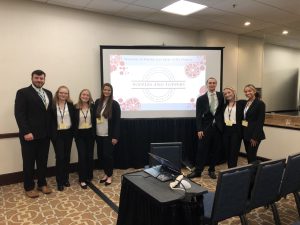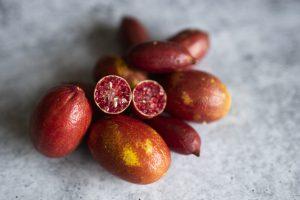This April, Gator NAMA, the University of Florida’s National Agri-Marketing Association student group, traveled to Kansas City, Missouri, for the annual NAMA conference. They competed in the student marketing competition with their marketing plan on finger limes.
The team consisted of seven undergraduate students: Amanda Heinzmann, Sara Beth Lee, Madeline Ricketts, Claire Smith, Emmie Victor, Robbie Sistrunk and Joshua Brooks.

Led by University of Florida Food and Resource Economics assistant professor and Gator NAMA advisor John Lai, students had spent the previous year working with faculty and industry members to develop a strategic marketing plan for finger limes.
“Our team wanted to solve a problem facing Florida agriculture, so we decided to create a marketing plan around citrus greening resistant finger limes as an alternative for Florida citrus growers,” Heinzmann said.
Finger limes, or Citrus australasica, are originally from Australia. Known for the small pearls that make up its flesh, this tangy citrus was recently introduced as a crop in the United States and has seen growing demand, particularly among high-end chefs and mixologists.
The University of Florida IFAS Tropical Research & Education Center (TREC) and Citrus Research and Education Center (CREC) are researching the crop and its market growth potential for Florida growers and others to take advantage of this new and emerging market.

Students from the Gator NAMA team also attended Southern Exposure, a tradeshow and conference for the Southeast Produce Council. They assisted University of Florida researchers in collecting feedback on the perception of finger limes as a product.
The Gator NAMA team came up with the concept of a company called “Lux Produce” that would sell the tiny citrus fruit to high-end restaurants and bars as “Poppers and Toppers.” Included in the marketing plan were a market analysis and strategies for promotion.
Gator NAMA competed against teams from more than 20 universities at the conference. While the team did not place in the competition, Lai said they performed well and were provided very positive feedback from judges on the exciting and unique product they developed.
“They worked very hard together as a cohesive team to prepare their executive summary and an engaging presentation,” Lai said. “It takes a lot of critical thinking, and even greater effort to create a high-quality presentation and this team exceeded my expectations.”
In addition to gaining practical experience, students established new network connections and learned about exciting careers in agricultural marketing.
“Through this experience, I was able to apply classroom knowledge in solving a real-world problem, work as a team toward something bigger than ourselves, and network with industry professionals,” Heinzmann said.
 0
0
